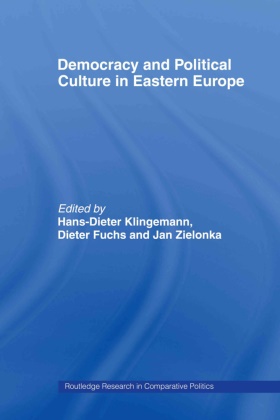Mehr lesen
Informationen zum Autor Hans-Dieter Klingemann is Professor of Political Science (emeritus) at the Freie Universität, Berlin, and Director (emeritus), Social Science Research Center Berlin, Germany. Dieter Fuchs is Professor of Political Science at the University of Stuttgart, Germany. Jan Zielonka is Ralf Dahrendorf Fellow in European Politics at St. Anthony¿s College, Oxford, UK. Klappentext What is the relationship between democracy and political culture in countries undergoing major systemic change? Have subjective political orientations of citizens been important in shaping the development of democracy in central and eastern Europe after the fall of communism? These core questions are tackled here by an impressive range of experts. Zusammenfassung What is the relationship between democracy and political culture in countries undergoing major systemic change? Have subjective political orientations of citizens been important in shaping the development of democracy in central and eastern Europe after the fall of communism? These core questions are tackled here by an impressive range of experts. Inhaltsverzeichnis Introduction: Support for Democracy and Autocracy in Eastern Europe Part 1: Comparative Perspectives 1. Democratic Communities in Europe: A Comparison between East and West 2. East European Value Systems in Global Perspective 3. Historical and Cultural Borderlines in Eastern Europe Part 2: National Perspectives 4. The Czech Republic: Critical Democrats and the Persistence of Democratic Values 5. Slovenia in Central Europe - Merely Meteorological or a Value Kinship? 6. Hungary: Structure and Dynamics of Democratic Consolidation 7. Slovakia: Pathways to a Democratic Community 8. Poland: Citizens and Democratic Politics 9. Latvia: Democracy as an Abstract Value 10. Lithuania: Civic Society and Democratic Orientation 11. Estonia: Changing Value Patterns in a Divided Society 12. Romania: Fatalistic Political Cultures Revisited 13. Bulgaria: Democratic Orientations in Support of Civil Society 14. Russia, Belarus, and Ukraine: Construction of Democratic Communities ...
Inhaltsverzeichnis
Introduction: Support for Democracy and Autocracy in Eastern Europe Part 1: Comparative Perspectives 1. Democratic Communities in Europe: A Comparison between East and West 2. East European Value Systems in Global Perspective 3. Historical and Cultural Borderlines in Eastern Europe Part 2: National Perspectives 4. The Czech Republic: Critical Democrats and the Persistence of Democratic Values 5. Slovenia in Central Europe - Merely Meteorological or a Value Kinship? 6. Hungary: Structure and Dynamics of Democratic Consolidation 7. Slovakia: Pathways to a Democratic Community 8. Poland: Citizens and Democratic Politics 9. Latvia: Democracy as an Abstract Value 10. Lithuania: Civic Society and Democratic Orientation 11. Estonia: Changing Value Patterns in a Divided Society 12. Romania: Fatalistic Political Cultures Revisited 13. Bulgaria: Democratic Orientations in Support of Civil Society 14. Russia, Belarus, and Ukraine: Construction of Democratic Communities
Über den Autor / die Autorin
Hans-Dieter Klingemann is Professor of Political Science (emeritus) at the Freie Universität, Berlin, and Director (emeritus), Social Science Research Center Berlin, Germany.
Dieter Fuchs is Professor of Political Science at the University of Stuttgart, Germany.
Jan Zielonka is Ralf Dahrendorf Fellow in European Politics at St. Anthony’s College, Oxford, UK.
Zusammenfassung
What is the relationship between democracy and political culture in countries undergoing major systemic change? Have subjective political orientations of citizens been important in shaping the development of democracy in central and eastern Europe after the fall of communism?
These core questions are tackled by an impressive range of twenty political scientists, sixteen of which are based in the central and eastern European countries covered in this essential new book. Their analyses draw on a unique set of data collected and processed by the contributors to this volume within the framework of the World Values Survey project. This data enables these authors to establish similarities and differences in support of democracy between a large number of countries with different cultural and structural conditions as well as historical legacies.
The macro-level findings of the book tend to support the proposition that support of democracy declines the further east one goes. In contrast, micro-level relationships have been found to be astonishingly similar. For example, support of democracy is always positively related to higher levels of education – no matter where an individual citizen happens to live. This new book builds a clear understanding of what makes democracies strong and resistant to autocratic temptation.

